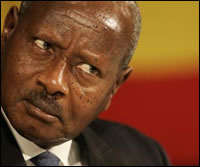Uganda: The Battle for Democracy Continues
 |
| President Yoweri Museveni |
The crusade to hold a referendum to revert to a multiparty dispensation was ironically championed (under donor pressure) by one who had hitherto demonized and vilified political parties. His argument was: “let’s get rid of them (tubegyeko) and let them go (mubaleke bagende.)” Initially, the movement was not meant to become a political party but to get rid of “pig-headed” dissenters so that it could remain “pure.” The reintroduction of political parties was not out of principle but expediency. The president has never been comfortable with parties. He prefers calling the NRM an organization.
Changed System; Same Players and Operation
The July 28 2005 referendum ushered in a new era of multiparty politics. Multiparty politics calls for fair competition which sadly has not been the case. The police are still directly controlled by the president and have assumed unlimited powers to grant permission to political parties on whether or not to hold meetings. President Museveni still has a patronizing attitude. Shortly after the 2006 elections, he invited the other parties that participated in the 2006 elections for talks. When Forum for Democratic Change refused, the president said he had saved his tea. One wonders whether the president was using his personal monies to run the talks or not.
The new Boss or the extension of the old Boss?
For more than two decades, President Museveni has remained the key actor in the politics of Uganda despite the cosmetic change of the political system. He has made it clear that he is not about to let go of state power as he is the only person with the vision. Since 1986, the country has been undergoing a transition. Although Museveni promised that he would pave way for multiparty democracy after four years of his rule, it has taken twenty years.The shift from the “movement” to the “multiparty” political dispensation was a trade-off for Museveni’s kisanja (third term). Many Museveni adherents argued that Museveni is an indispensable resource in a new political dispensation.
 |
| Symbol of the National Resistance Movement party |
President Museveni is partly responsible for the current dilemma (intra-party wrangles) within the old political parties- Democratic Party (DP), Uganda People’s Congress (UPC) and the Conservative Party (CP). As soon as he captured power, he vilified them, demonized them and embarked on politicization and brainwashing programmes.
Whereas I don’t support the discriminative nature of the Democratic Party and Uganda People’s Congress, I wish to aver that the political parties were far less discriminative compared to the Movement. This is because even though parties were largely founded on the basis of religion that cut across the entire nation, the movement was largely dominated by the “freedom fighters”, friends and relatives. At the end of the day, one region and one ethnic group dominated. The system that was meant to be inclusive became exclusive. Ironically, the person who used to bash political parties because of discrimination presided over the largely discriminative movement. Consequently, many would be movement pillars had to jump off the movement boat: Bidandi Ssali, Kiiza Besigye, Augustine Ruzindana, Eriya Kategaya (although he later made a round turn), Mugisha Muntu, Winnie Byanyima, Amanya Mushega, Richard Kaijuka, Salaam Musumba, David Pulkol, Henry Tumukunde, the list is endless.
The president has personalised all the critical state institutions (the Police, the Judiciary, the Electoral Commission, the Uganda Human Rights Commission) and political parties. The movement and the National Resistance Movement (NRM) now revolve around the personality of Museveni. This has had a spillover onto other parties such as Forum for Democratic Change (FDC) which revolves around the personality of Dr. Besigye and Uganda People’s congress that revolves around the Obote family. Political parties are not electric switches that one can put on and off at will. They are indispensable institutions in the democratic process. They are engines through which fundamental freedoms of expression, association, assembly, choice and so forth are enjoyed.
What should be the role of opposition parties in critical institutions like the judiciary, electoral commission, and the police and human rights commission in a multiparty setting? Won’t the ruling party dominate these institutions to the disadvantage of other parties? How should political party activities be funded? If they are to be funded by the government, won’t the ruling wish to set a pace for these parties? If parties are to be funded by the government won’t this compromise their independence? If that be the case, what does such a situation portend for our fledgling democracy?
Conclusion
 |
| Results of a past political rally |
